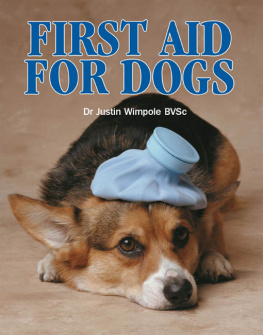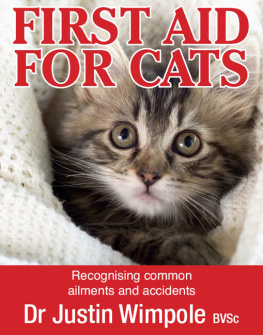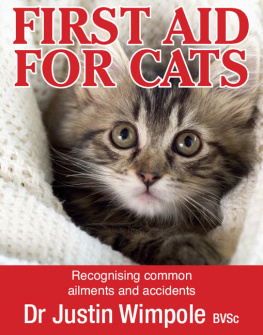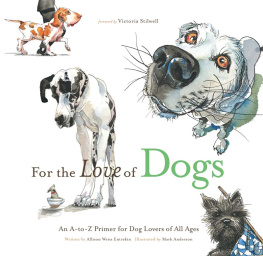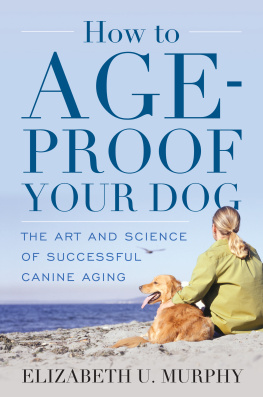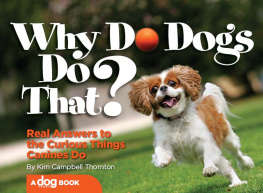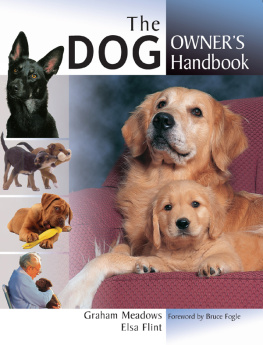First Aid for Dogs
First published in Australia in 2005 by
New Holland Publishers (Australia) Pty Ltd
Sydney Auckland London Cape Town
www.newholland.com.au
14 Aquatic Drive Frenchs Forest NSW 2086 Australia
218 Lake Road Northcote Auckland New Zealand
86 Edgware Road London W2 2EA United Kingdom
80 McKenzie Street Cape Town 8001 South Africa
Copyright 2005 in text: Justin Wimpole
Copyright 2005 in images: Gregory Lamont
Copyright 2005 New Holland Publishers (Australia) Pty Ltd
All rights reserved. No part of this publication may be reproduced, stored in a retrieval system or transmitted, in any form or by any means, electronic, mechanical, photocopying, recording or otherwise, without the prior written permission of the publishers and copyright holders.
National Library of Australia Cataloguing-in-Publication Data:
ISBN 1 74110 282 0
eISBN 9781921655234
First Aid for Dogs
By Dr Justin Wimpole BVSc (hons)
Acknowledgments
Many people have helped me through my training to become a veterinarian and deserve recognition and thanks. My parents, Denis and Helena, have always been supportive of all of my pursuits throughout my schooling in Melbourne and university in Sydney. My brother has been a great mate and very encouraging.
My special thanks go to my partner, Dr Kate Patterson, who has been my companion through both the relaxing and the challenging times. Her family: Roger, Janice and Lisa has always been open and welcoming, for which I am most appreciative. My gratitude goes to my diverse group of friends, who have been so much fun and have given me support and guidance.
I thank my dedicated and dynamic colleagues in the Veterinary profession, who continue to inspire me, especially my colleges at the Veterinary Specialist Centre and the Animal Critical Care and Emergency Service in North Ryde. I have been privileged to work with you and share your expertise. I extend a special thanks to my mentors: Professor Trevor Heath, Professor David Fraser and Professor Klaus Beyenbach who ensured my professional development.
Thanks to Fiona Schultz and the staff at New Holland, for their support and encouragement, and to my agents Clare Calvet and Xavier Waterkeyn of Flying Pigs. Thanks in particular to Xavier, my friendly, experienced mentor and a writer himself. He provided vital advice and assistance in writing this, my first book.
Finally I would like to thank my patients. You are all very different and very special. You teach me new things every day.
Contents
Introduction
Dogs are a very special part of our lives. They provide unconditional love and companionship and are integral parts of our families. Dogs become our family and we become their pack. As well as providing friendship dogs serve their owners in more tangible ways. There are countless stories of dogs rescuing their owners from attackers or alerting their families to danger. Many people rely on their dogs for work: think of the contribution dogs make to the police, to the military and the vital role of guard dogs. The Beagles accurate sense of smell and obsession for food makes them a valuable addition to our quarantine service. Guide dogs provide life changing help to their visually impaired owners while assistance and companion dogs provide a variety of valuable services to their disabled owners.
Although dogs are so helpful and important to our lives, they rely on people to care for them. Due to their importance to us and their dependence on us we want to look after them. When our dogs are sick or injured we want to do all that we can to help them. Unfortunately, there are many hazards to our faithful companions. We can easily find ourselves in situations where they need our help, but we may feel helpless and ill prepared to be of any assistance.
As dogs have become a more and more important part of our society, the range of available veterinary services has improved. There are 24-hour emergency centres in most capital cities and in some regional centres too. Most areas have veterinarians who provide after-hours service on an as-needed call-out basis. In most instances the best thing that can be done for your sick or injured dog is to seek prompt veterinary attention. This allows professional assessment and access to diagnostic testing and timely treatment.
Unfortunately not all owners have access to veterinary attention at all times. This book provides some basic information to dog owners and carers to better equip them to help their dog in an emergency. It by no means aims to replace or delay veterinary assistance. Treating it as such is dangerous. You should only intervene when it is imperative that something is done immediately, when you have no access to veterinary attention or the closest veterinary hospital is far away. Sometimes an owner can save their dogs life by giving appropriate first aid.
When I provide veterinary attention to animals, I always attempt to apply the philosophy of do no harm. The information in this book is presented with that principle in mind. Unfortunately, when owners or even veterinarians try to help a sick or injured dog, there is the potential to cause more harm. This is obviously not intentional. It is imperative that first aid given to a sick or injured dog helps the dogs situation rather than hinders it.
By reading this book to better equip yourself for emergencies involving your dog you are showing a real commitment to your companion. Hopefully you will never have to use the information presented in this book, but should the need arise you will be better equipped to deal with the situation.
Disclaimer
This book was written to offer dog owners and lovers first aid advice when dealing with emergencies involving dogs. It was written using veterinary knowledge and experience, but should never be used as a substitute for professional assessment, advice or care. In some instances providing first aid has the potential to cause harm to the patient and the person providing it. It is the responsibility of the reader to consider these risks when deciding on a course of action in any particular situation. Readers should be aware that, even with the benefit of a veterinary hospital setting, the outcome of emergency situations can be undesirable including permanent injury or loss of life. Results can be expected to be even less successful in the field situation. The illustrations have been included as a guide and are not intended to be complete, step-by-step instructions.
The author and publisher cannot be held responsible for any loss or personal injury caused by the application of any advice provided in this book.
If in doubt, please contact your nearest veterinary hospital immediately.
For Magic Burnley 3rd August 2000 to 6th September 2004.
Magic was an Australian show champion and a champion in the eyes of all that knew her.
She lived life to the full and tried her best right until the end, as did her family.
She is gone but not forgotten.
Being Prepared
The most important aspect in being prepared for an emergency involving your dog is to have a good ongoing relationship with your veterinarian. You can easily achieve this by attending to your dogs routine preventative medicine requirements. This involves having your dog vaccinated and examined regularly. Regular visits allow you to obtain advice on flea control, intestinal worm and heartworm prevention, diet, training and other aspects of caring for your dog. Seeing your veterinarian regularly will also allow your veterinarian to identify and manage your dogs individual issues and be aware of them in case of an emergency.

